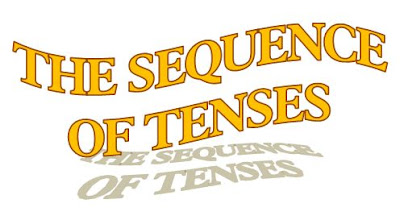In a sentence, the tense
of verb in the subordinate clause follows the tense of verb in the principal
clause. This rule is called the sequence of tenses.
There are two main rules
governing the sequence of tenses:-
1. If there is past tense in the principal clause, it must be
followed by a past tense in the subordinate clause:
a. I knew that he wanted
to go home.
b. He succeeded because
he worked hard.
c. He was content
although he was poor.
d. He never understood
how this came about.
e. I would do this if I
were allowed.
f. I told you that I
would help you.
2. If there is present or future tense in the principal clause,
it may be followed by any tense by the sense in the subordinate clause:
a. I think that the picture is beautiful.
b. I shall tell you what I heard.
c. You know that the story was not true.
d. He says that he will go there.
e. You will learn that she works hard.
f. He will say that she will work well.
Exceptions:-
1.
When subordinate clause expresses a universal truth, habit or a tradition, it
will be in present tense, no matter if principal clause is in past tense; as:-
a. The teacher said that
the earth revolves round the sun.
b. I told him that I
take exercise daily.
2.
If principal clause is in past tense, subordinate clause may be followed by any
tense provided that it denotes comparison, place or reason; as:-
a. She sang as
melodiously as Lata does.
b. He was more nervous
than a girl can be.
3.
If subordinate clause is an adjective clause, it may follow any tense according
to sense; as:-
a. I showed him the
college which is known for high standards of education.
b. He was the man who is
loved by all.
4.
Principal clause may be in any tense, ‘should’ is always with conjunction
‘lest’ in subordinate clause; as:-
a. The old man walked
slowly lest he should fall.
b. I shall take exercise
daily lest I should fall ill.
5.
If subordinate clause is introduced by ‘as if’ or ‘as though’, past tense is
used when principal clause is in present tense, but if principal clause is in
past tense, past perfect tense is used; as:-
a. He cried as though he
had been hit by a bullet.
b. She laughed as if she
had gone mad.
6.
If subordinate clause is introduced by conjunction ‘than’, any tense may be
followed by any tense; as:-
a. She likes you better than
she liked me.
b. She liked you better
than she likes me.
7.
If subordinate clause is introduced by conjunction ‘as well as’, any tense may be followed by any tense,
according to the sense intended by the speaker; as:-
a. She likes me as well
as she liked him.
b. She liked me as well
as she likes him.
8.
If the verb in the principal clause is in the past tense, the verb in the
subordinate clause must be expressed by ‘might’; as:-
a. He worked hard that he might succeed.
b. He was working hard that he might succeed.






No comments:
Post a Comment